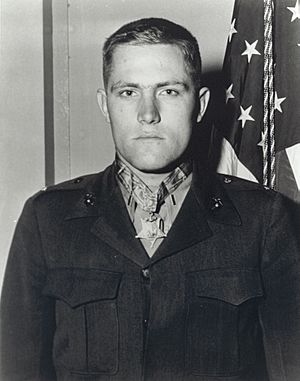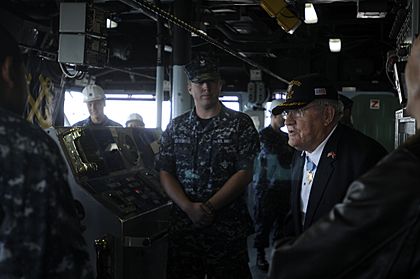Arthur J. Jackson facts for kids
Quick facts for kids
Arthur J. Jackson
|
|
|---|---|
 |
|
| Born | October 18, 1924 Cleveland, Ohio |
| Died | June 14, 2017 (aged 92) Boise, Idaho |
| Place of burial |
Idaho State Veterans Cemetery, Boise, Idaho
|
| Allegiance | |
| Service/ |
|
| Years of service | 1943–1945, 1959–1962 (Marine Corps) 1945–1959, 1962–1984 (Army) |
| Rank | Captain |
| Unit | 3rd Battalion, 7th Marines |
| Battles/wars | World War II
|
| Awards | Medal of Honor Purple Heart (2) |
Captain Arthur Junior Jackson (October 18, 1924 – June 14, 2017) was a brave U.S. Marine who earned the Medal of Honor, America's highest award for military bravery. He received this honor for his amazing actions during World War II on the island of Peleliu. At just 19 years old, Private First Class Jackson showed incredible courage by single-handedly destroying 12 enemy bunkers and defeating 50 enemy soldiers. He was also the last surviving Medal of Honor recipient from the tough Battle of Peleliu.
Contents
Early Life and Joining the Marines
Arthur J. Jackson was born in Cleveland, Ohio, on October 18, 1924. He grew up in Canton, Ohio, and later moved to Portland, Oregon, with his family in 1939. He graduated from Grant High School in Portland. After finishing school, he worked in Alaska for a construction company. In November 1942, at the age of 18, he returned to Portland and joined the United States Marine Corps.
Military Service
Heroic Actions in World War II
In January 1943, Arthur Jackson began his recruit training at the Marine Corps Recruit Depot San Diego, California. By June 1943, he joined the 1st Marine Division in Melbourne, Australia.
His bravery was first recognized on January 13, 1944, during the Cape Gloucester campaign. He risked his own life to carry a wounded Marine to safety while under enemy fire on a steep hill. This heroic act saved the man's life, and Jackson received a special commendation for it.
Later, as a Private First Class with the 3rd Battalion, 7th Marines, he fought in the fierce Battle of Peleliu. During this battle, he was wounded but continued to fight with incredible courage. His actions on Peleliu earned him the Medal of Honor and his first Purple Heart. He then went on to fight in the Battle of Okinawa, where he was wounded again on May 18, 1945, while serving as a platoon sergeant.
On October 5, 1945, President Harry S. Truman personally presented him with the Medal of Honor at the White House. This is the highest award for bravery a service member can receive.
Post-War Service and Retirement
After World War II, Jackson served in northern China during the post-war occupation. He briefly left the military but soon joined the United States Army Reserve. By 1954, he had reached the rank of captain in the Army Reserve. He also served with the army during the Korean War.
In 1959, he returned to the Marine Corps. He later left the Marine Corps in 1962. He remained active in the Army Reserves and eventually retired from that service in 1984. He also worked for the United States Postal Service.
Arthur Jackson lived in Boise, Idaho, during his retirement. He passed away at a hospital there on June 14, 2017, at the age of 92.
Awards and Decorations
| Medal of Honor | |
| Navy and Marine Corps Commendation Medal | |
| Army Commendation Medal | |
| Purple Heart with award star | |
| Presidential Unit Citation | |
| China Service Medal | |
| American Campaign Medal | |
| Asiatic-Pacific Campaign Medal with three campaign stars | |
| World War II Victory Medal | |
| Navy Occupation Service Medal with "Japan" clasp | |
| National Defense Service Medal | |
| Korean Service Medal with two campaign stars | |
| Armed Forces Reserve Medal | |
| United Nations Service Medal for Korea |
See Also
 | Kyle Baker |
 | Joseph Yoakum |
 | Laura Wheeler Waring |
 | Henry Ossawa Tanner |


